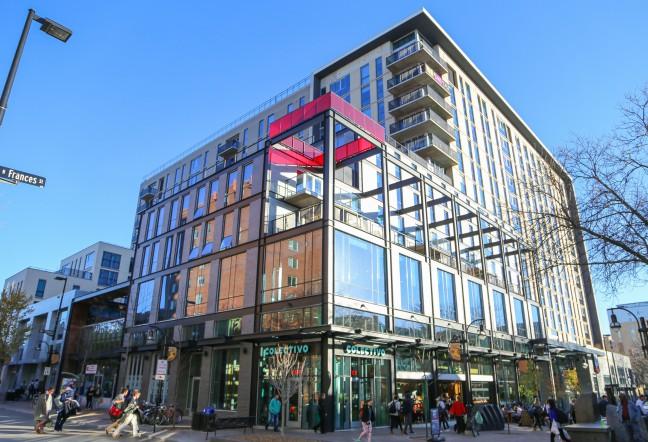The Madison City Council recently rejected a development proposal that would have added upwards of 200 luxury apartments in the downtown area.
The luxury apartment development was proposed by Chicago-based developer Core Spaces, which has worked to develop several properties around the city in the past. Under the proposal, affordable rental units would have been demolished to build a 12-story luxury apartment complex.
Though President Eli Tsarovsky and Vice President Cleo Le of the Campus Area Neighborhood Association were not directly involved in the City Council’s decision, they began the conversation surrounding the proposed development project.
In early May, CANA requested deferment for the project, to grant them more time for community outreach and to give the development team ample time to compose an informative package regarding the development proposal for the community, according to Le.
“What we strive to do at CANA is to come with transparency, come with information and come with neighborhood input and try to do as much outreach as possible,” Tsarovsky said.
Based on CANA’s outreach, they presented the Council with a report of concerns and input from those most affected in the community. The report also included what the developers told those in the association about the project, and how those conversations progressed.
The City Council voted 13-6 to reject the proposal which would have destroyed affordable student housing units in the area. Though the development project was overturned, the issue of affordable housing in Madison persists.
Since the market rate value of these luxury apartment complexes is already abnormally high, Tsarovsky fears as many of these other developments begin to hit the market in the next few years, the prices will only continue to rise or remain stagnant.
“Yes, these developments are market rate housing, but also look at what the market shows us right now,” Tsarovsky said. “And honestly, in my heart I do not completely agree that once all this housing hits the market, the prices will go down.”
Tsarovsky and Le referred to the situation as a housing experiment in Madison. While they recognize luxury apartments will be hitting the market in the years to come, they also acknowledge that it is impossible to predict the effect that it will have on the housing market at that time. They are also concerned about how current students will be supported in the coming years as more affordable housing is demolished to create room for luxury complexes in the area.
“If things are being demolished, that’s less housing available in this area, so the housing crisis is only going to get worse until more is built,” Le said.
The buildings set to be demolished by Core Spaces are prime examples of “naturally occurring affordable housing” which represents older homes and buildings without amenities such as air conditioning, making them less valuable.
“I would define affordable housing as basically, students can pay a little bit of what they earn to rent and still have money left over to afford groceries, pay for food, go out and then still have some money to spend at the end of the day,” District 8 Alder MGR Govindarajan said. “That is not the case in Madison.”
While state law prevents Madison from implementing any form of rent control, Govindarajan believes some measures can be taken to alleviate housing affordability issues throughout the city.
“What I would love to see Madison do at the end of the day is to build more affordable housing in general,” Govindarajan said. “So, this means we do not need luxury pools or gyms within the buildings when we have the Nick and the Bakke Center, for example. Just focus on what students need and not all the extra amenities — I think that is a great place to start.”
According to Govindarajan, there are a considerable number of inconsistencies when it comes to the availability of housing options in different price ranges.
“There’s a lot of high-income housing, and there’s a decent bit of low-income housing, but there’s not a lot of middle-income housing and that’s what I mean by affordability,” Govindarajan said.
When discussing the importance of housing affordability, the representatives from CANA stressed the importance of sustainable affordable housing.
“Not only are we trying to push the idea that we need affordable housing, but we also need quality affordable housing that does not violate tenant rights,” Tsarovsky said.
Le also discussed the difficulties that come with the affordable housing phenomenon and how it intersects with Wisconsin state policy.
“I think it’s a very interesting question on a policy level because both the university and the city have a responsibility for creating enough housing in the market so there are affordable prices,” Le said. “Unfortunately, college students are not a protected group in terms of being eligible for what would typically be seen as affordable housing for low-income individuals.”



